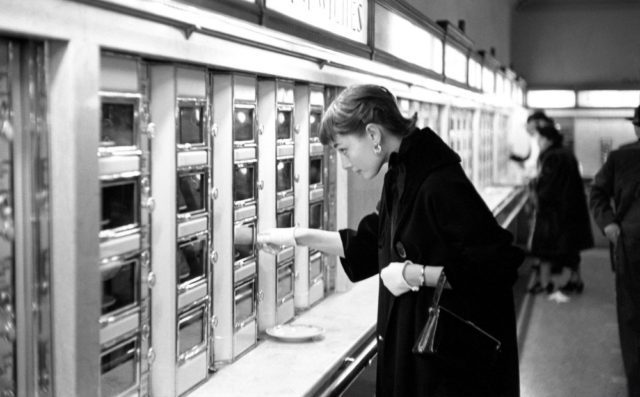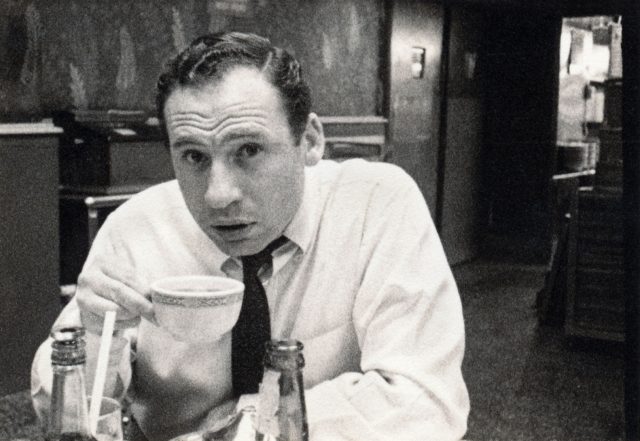
Audrey Hepburn grabs a bite at the Automat in New York City (photo by Lawrence Fried, 1951)
THE AUTOMAT (Lisa Hurwitz, 2021)
Film Forum
209 West Houston St.
Opens Friday, February 18
212-727-8110
filmforum.org
automatmovie.com
New Yorkers are used to saying goodbye to iconic institutions, from the old Penn Station and Ebbets Field to the Carnegie Deli and the Stork Club. One of the hardest to bid farewell to was a most unusual eatery that catered to anyone who had a couple of nickels and time for a quick lunch or dinner: the Automat, a type of self-service restaurant that flourished in New York City and Philadelphia, predominantly during the first six decades of the twentieth century.
At the beginning of Lisa Hurwitz’s thoroughly satisfying yet elegiac debut documentary, The Automat, comedian Mel Brooks tells her, “I’m going to give you what I can in terms of time and effort, and I’ll try to write the song.” He continues, “I suggest you do some narration at the beginning to frame what you’re going to talk about. You know, with pictures — do you have enough pictures of Automats?”
Hurwitz has plenty of pictures of Automats and just the right narrator to open the film, Brooks himself, who explains, “Of course, when you say ‘Automat,’ or ‘Horn & Hardart,’ very few people know what you’re talking about. But one of the greatest inventions in insane centers of paradise were these places that had little glass windows framed in brass with knobs, and if you put two nickels into the slot next to the windows, the windows would open up, and you could take out a piece of lemon meringue pie for ten cents and you could eat it.”
Brooks is one of many people who more than just enjoyed going to the Automat; for them, it was an integral part of their lives, a place to gather with friends, colleagues, and family, schmooze a bit, and have a cheap but good meal. From 1902 to 1991, the Automat served young and old, rich and poor; race, religion, politics — none of that mattered in the egalitarian spaces.
The late Supreme Court Justice Ruth Bader Ginsberg recalls, “Yes, this is the great USA, with people of all different colors, and religions, and manner of dress, and yet we are all together.” The late Secretary of State Colin Powell notes, “All the Automats had that beautiful diversity that didn’t exist in most of the rest of the country, of economic standing, of color, of ethnicity, of language. You never knew what you’d run into in an Automat.” Among the others waxing poetic about the Automat are Carl Reiner, Elliott Gould, former Philly mayor Wilson Goode, and former Starbucks chairman and CEO Howard Schultz, who says, “The Automat for me was a seminal moment in my childhood, and I became a merchant the day that I was in that Automat.” Brooks declares, “The Automat had panache.”
Made over the course of seven years, the film also features interviews with Lorraine Diehl and Marianne Hardart, authors of The Automat: The History, Recipes, and Allure of Horn & Hardart’s Masterpiece; former Automat VP of engineering John Romas; Edwin K. Daly Jr., whose father was president of Horn & Hardart from 1937 to 1960; New York City historian Lisa Keller; H&H architect Roy Rosenbaum; architectural dealer and restorer Steve Stollman, who bought a lot of the old mechanisms when the restaurants closed; and historian Alec Shuldiner, whose PhD dissertation inspired Hurwitz to make the film.

Mel Brooks sings the praises of the Automat in loving documentary (photo by Carl Reiner)
There are tons of great photos and film clips in the documentary, including shots of Audrey Hepburn, Debbie Reynolds and Eddie Fisher, Jackie Gleason, Donna Reed, Abbott & Costello, and James Dean at the Automat and scenes from That Touch of Mink, The Bob Hope Show, The Flintstones, Warner Bros. cartoons A Hare Grows in Manhattan and Tree Cornered Tweety, Candid Camera, and such old movies as The Early Bird, No Limit, and Thirty Day Princess. Jack Benny hosts an opening there, giving out nickels to his guests. The Irving Berlin and Moss Hart musical Face the Music begins with the song “Lunching at the Automat.”
Hurwitz also deals with socioeconomic change that helped make the Automat so popular after the Great Depression and through both wars and, later, led to its downfall. The sentimental attachment everyone has for the Automat in the film is contagious, even if you never had the baked beans, ham and cheese sandwich, or creamed spinach; it was a special place to so many through several generations, and Hurwitz captures those sentimental feelings with panache while leaving you with an ache in your heart and stomach — and a song from Mel Brooks. The Automat opens February 18 at Film Forum, with Hurwitz participating in Q&As on Friday at 7:00, Saturday at 7:30, and Sunday at 5:40.